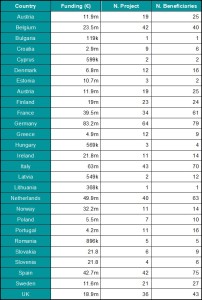The European Union recently updated the 2012 Bioeconomy Strategy to ensure a more sustainable supply and a better management of resources at both EU and global level, whereas European countries already host several bioeconomy projects. Let’s have a look.
The 2012 EU Bioconomy Strategy
Bioconomy is a broad term generally encompassing those sectors of the economy employing renewable biological resources from land and sea such as crops, forests, fish, animals and micro-organisms to produce food, materials and energy. A bioeconomy-based approach therefore constitutes a great opportunity for societies to be more innovative, resource-efficient by reconciling food security with the sustainable use of biotic renewable resources for industrial purposes, while ensuring environmental protection at the same time.
The 2012 Bioeconomy Strategy for Europe identified 5 main sectors of intervention: ensuring food security, a sustainable management of natural resources, climate change mitigation and adaptation, reducing dependence on non-renewable resources, creating job opportunities and supporting EU competitiveness. The related Action plan was particularly effective in the mobilization of R&I investments across Member States, in terms of bioeconomy funding in the framework of Horizon 2020 programme as well as in terms of EU support to national financings. The BioBased Industries Joint Undertaking, a €3.7 billion partnership between the EU and the Bio-based Industries Consortium, successfully supported dozens of projects in the field of the bioeconomy.
Even though several 2012 Bioeconomy Strategy objectives have been included in many European national and regional bioeconomy strategies such as the Smart Specialisation Strategies (Cohesion Policy), a recent review of the Strategy underlined a poor correspondence between the strategic objectives and the actions as defined by the Action Plan. Furthermore, an insufficient and monitoring framework hindered the achievement of policy coherence, especially in the light of recent global policy developments.
The 2018 Update of EU Bioconomy Strategy: same goals, actions refocused
By consequence, the aim of the Updated Bioeconomy Strategy for Europe, launched by the European Commission in October 2018, is to maximize the support to a modernisation and a strengthening of the EU industrial base to build a sustainable bioeconomy as a renewable segment of the wider, circular, economy in line with the process of the Energy Union constitution. For this purpose, the 2018 update determined 14 concrete new actions.
As far the first action area is concerned, related to the strengthening and scaling-up of the bio-based sectors by unlocking investments and markets, the EU committed to:
- mobilise both public and private stakeholders in relation to Research & Demonstration and Deployment projects;
- develop the Circular Bioeconomy Thematic Investment Platform, a targeted financial instrument for about EUR 100 million;
- identify bottlenecks, enablers and gaps as well as to provide a voluntary guidance to the development of bio-based innovations;
- promote and/or develop standards and market-based incentives and improve labels referring to bio-based products;
- facilitate the development of new sustainable biorefineries;
- ease the replacement of fossil-based materials with bio-based resources as well as the implementation of bio-remediation methods to contribute to plastic-free and sustainable European seas and oceans.
Concerning the deployment of local bioeconomies across Europe, EU decided to:
- develop a Strategic Deployment Agenda to link actors in supporting innovations and best practices within sustainable food and farming systems, forestry and bio-based production;
- support several pilot actions in the field of blue bioeconomy, rural and urban development;
- set up a EU bioeconomy policy support facility and a Bioeconomy forum for Member States;
- foster new education, training and skills in the field.
A deep knowledge and understanding of specific bioeconomy areas need more data to be acquired and subsequent information increased in parallel with systemic analyses. For this reason, EU aims at:
- ehancing a better comprehension of bioeconomy to make it accessible through the Knowledge Centre for Bioeconomy;
- implementing an international coeherent monitoring system on the status of biodiversity, ecosystem, degraded land areas and land at risk of climate change impacts;
- providing a voluntary guidance for operating the bioeconomy within safe ecological limits;
- better integrating the benefits of biodiversity-rich ecosystems in primary production through a specific support to several sectors i. e. agro-ecology.
The Renewed European Agenda for Research and Innovation has the scope of increasing the impact of UE Research and Innovation. Horizon 2020 programme and the European Regional Development Fund (ERDF) will keep on delivering important output in a complementary manner: EUR 10 billion are foreseen within the Horizon Europe cluster “Food and Natural Resources”.
Cities will play a key role as bioeconomy hubs, as stated by the 2018 update of the Bioeconomy Strategy. The development of circular urban development plans and the implementation of strategies of bio-waste valorisation may have many positive effects, as bio-waste flows contain that could be turned into bio-based products.
BBI JU projects across Europe
The Bioeconomy Country Fact Sheets which have been released by BBI Joint Undertaking on the 7th of November, give a short overview of current bioeconomy policies and financings as well as BBI JU projects within each European state. Germany, followed by The Netherlands, Spain and France, is the country which received the most of financing so far.
Communication
Policy support
ICT Tools
|
|
|
Algae and Microalgae, aquatic micro-organisms valorisation
Acquaculture
Automotive
Agricultural biomass to bioproducts
Biochemical
Biomedic, Cosmetics
Biofuels
Biogas
Bioplastics & Packaging
Fertilisers |
Food Industry
Forestry Management
Lignocellulosic Valorisation
Mushrooms Valorisation
Waste & Wastewater
|



